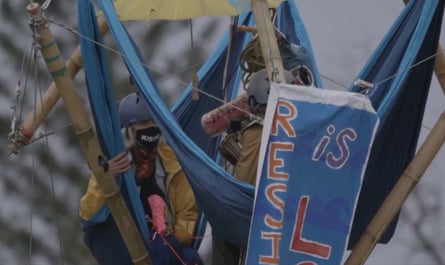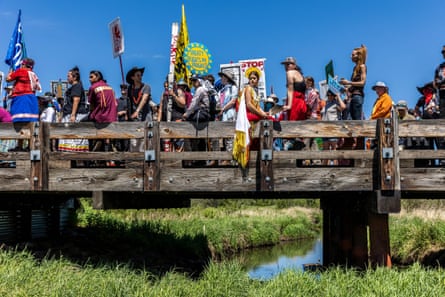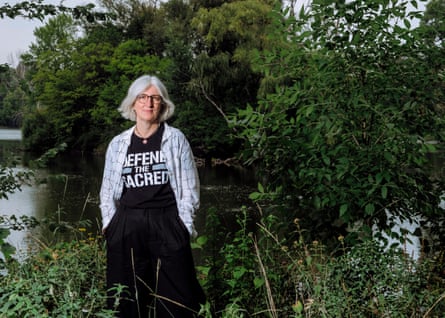cross-posted from the Guardian
Mylene Vialard goes on trial this week for opposing a pipeline on Indigenous land amid warnings peaceful protest is under threat
by Nina Lakhani, climate justice reporter
54-year-old climate activist who was among hundreds of peaceful protesters criminalised for opposing the construction of an oil pipeline through pristine Indigenous lands is facing up to five years in prison, amid growing alarm at the crackdown on legitimate environmental protests.
Mylene Vialard was arrested in August 2021 while protesting in northern Minnesota against the expansion and rerouting of Line 3 – a 1,097-mile tar sands oil pipeline with a dismal safety record, that crosses more than 200 water bodies from Alberta, Canada, to refineries in the US midwest.
Vialard was charged with felony obstruction and gross misdemeanour trespass on critical infrastructure after attaching herself to a 25ft bamboo tower erected to block a pumping station in Aitkin county. The gross misdemeanour charge, a post 9/11 law which has been used widely against protesters, was eventually dismissed after a court ruled there was insufficient evidence.
Vialard refused to take a plea deal on the felony charge, and her trial opens in Aitkin county on Monday.
“It was kind of a torturous decision. But in the end, I couldn’t sign a piece of paper saying I was guilty because I’m not the guilty party here. Enbridge is guilty, the violation of treaty rights, the pollution, the risk to water, that is what’s wrong. I’m just using my voice to point out something that’s wrong,” said Vialard, a self-employed translator and racial justice activist from Boulder, Colorado.
“I’m preparing my house for the worst case scenario,” she added.

Environmental activists protest in front of the construction site for the Line 3 oil pipeline site in 2021. Photograph: Kerem Yücel/AFP/Getty Images
Vialard’s arrest was not an anomaly. Minnesota law enforcement – which along with other agencies received at least $8.6m in payments from the Canadian pipeline company Enbridge – made more than 1,000 arrests between December 2020 and September 2021.
The protesters, who identified as water protectors, were arrested during non-violent direct actions across northern Minnesota as construction of the 330-mile line expansion jumped from site to site, in what campaigners say was a coordinated strategy to divide and weaken the Indigenous-led social movement – an allegation Enbridge denies.
Overall, at least 967 criminal charges were filed including three people charged under the state’s new critical infrastructure protection legislation – approved as part of a wave of anti-protest laws inspired by the American Legislative Exchange Council (Alec), a rightwing group backed by fossil fuel companies.
Among those criminalised were a grandfather in his late 70s, numerous teenagers, first-time protesters and seasoned activists – many of whom travelled long distances amid growing anger and desperation at the government’s lack of urgency in tackling the climate emergency.
Yet the vast majority of charges were eventually dismissed – either outright by prosecutors and judges or through plea deals, suggesting the mass arrests were about silencing and distracting protesters, according to Claire Glenn, an attorney at the Climate Defense Project.
“It was obviously not about criminal sanctions or public safety because otherwise the prosecutors would not be dismissing these cases left and right. Enbridge was paying police to get people off the protest line and tied up with pretrial conditions, so they could get the pipeline in the ground, and it worked,” said Glenn, who has represented more than 100 Line 3 protesters including Vialard.
In a statement to the Guardian, Enbridge said the protesters were not arrested for peaceful protest but acted in ways that were “illegal and unsafe”, endangering themselves and others and causing damage.
Line 3 has a long track record of environmental disasters since it began operating in 1968, including a 1.7m gallon spill at Grand Rapids, Minnesota, in 1991 which remains the largest inland oil leak in US history. Enbridge reduced its capacity amid growing concerns about the pipeline’s safety, but in 2014 announced a multibillion-dollar project to expand and partially reroute the pipeline.
Construction went ahead everywhere except Minnesota due to widespread opposition from tribal nations, some state agencies, and climate and environmental groups. But in late 2020, regulators granted the remaining permits, and construction began in freezing cold December as thousands of Americans were dying every week from Covid.
Vialard and her teenage daughter were among thousands of ordinary people from across the US to respond to Indigenous activists requesting help in protecting their sovereign territory and water sources.
“The video of Indigenous leaders calling on white people to show up and do what was necessary to protect the land was very moving. There’s been so much racism and so much abuse towards Indigenous people throughout history, that this felt like part of the work that we need to do,” Vialard said.
It wasn’t the first time an Indigenous-led movement garnered wider public support.

Line 3 was Vialard’s first experience of civil disobedience or direct action. Photograph: Youtube
The huge 2016 gathering of tribes and allies defending Standing Rock Sioux territory from the Dakota Access pipeline captured the world’s attention, and inspired a global movement of resistance to fossil-fuel infrastructure projects. The protest was brutally policed but the tribe never backed down and succeeded in forcing an environmental impact study – which could eventually shut down the pipeline.
The Standing Rock success triggered a wave of new anti-protest laws and could explain why in Minnesota Enbridge made it difficult for activists – and the media – by constructing at multiple sites simultaneously, according to the attorney Glenn.
Vialard had supported Standing Rock from afar but Line 3, located more than 1,000 miles from Boulder, was her first experience of civil disobedience or direct action. The arrests were tough – but Vialard says that the environmental destruction she saw was even harder.
“People being arrested was the reality. But I was mostly worried about the destruction of pristine lands that I was witnessing. I went to the headwaters of the Mississippi, such an iconic gorgeous river full of rare species, and to turn around and see this big swath of destruction through the forest … that was really very moving to me, it just breaks my heart.”
The new Line 3 started transporting oil in October 2021.
Minnesota environmental regulators have confirmed four groundwater aquifer breaches along the new pipeline – including one last month in Aitkin county, not far from where Vialard was arrested, at a wild rice lake in an area with complex wetlands and peat bogs. Enbridge, which reported gross profits of $16.55bn for the year ending June 2023, has so far been fined $11m to address the breaches, which a spokesperson said “Enbridge reported transparently and corrected them consistent with plans approved by the agencies.”

Climate activists and Indigenous community members gather on top of the bridge after taking part in a traditional water ceremony during a rally and march to protest the construction of Enbridge Line 3 pipeline in Solvay, Minnesota, on 7 June 2021. Photograph: Kerem Yücel/AFP/Getty Images
Oil from tar sands is among the dirtiest and most destructive fossil fuels, emitting three times as much planet-heating pollution as conventional crude oil. Environmentalists say the Line 3 expansion was the equivalent of adding 38m fossil fuel-powered vehicles to our roads.
Many of the Line 3 defendants – including Vialard’s daughter – opted for plea deals, but the legal wrangling still tied people up for months or years. Some were left with a criminal record while others were able to secure a “deferred adjudication” plea in exchange for the charge being erased after a probationary period that restricted their ability to protest, find work and travel.
Vialard’s is only the second felony case to reach the trial phase, but several other Line 3 cases remain open and a misdemeanor trial against 70-year-old Jill Ferguson also begins on Monday, in Clearwater county. Next month three Anishinaabe women elders – Winona LaDuke, Tania Aubid and Dawn Goodwin – will go on trial together on gross misdemeanour critical infrastructure charges related to a January 2021 protest.
But the mass arrests and criminalization of Line 3 activists is part of a nationwide – and global – trend of suppressing legitimate protests about climate and environmental harms, according to Marla Marcum, director of the Climate Disobedience Centre, which supports climate activists engaged in civil disobedience in the US.
“The pattern of heavier and heavier criminalization is undeniable. It’s a tactic which aims to divide and distract activists, suppress dissent and stop ordinary folks getting involved as more and more people wake-up to the urgency of the situation … tying people up for years is a huge emotional and energy drag.”

Demonstrators gather at the Minnesota state capitol during a rally to stop Line 3 in August 2021. Photograph: Bloomberg/Getty Images
Marcum says that most environmental activists are being charged with serious crimes from old statutes such as domestic terrorism and gross trespass.
Yet since 2017 45 states have passed or tried to pass new legislation that further restricts the right to protest, and which expands penalties for protesters. At least three states – Oklahoma, Iowa and Florida – have passed legislation providing some impunity for those who injure protesters, according to the International Center for Not-For-Profit Law, which tracks anti-protest bills.
“When a protest movement is righteous, effective and powerful, the US government responds by trying to chill, deter and criminalise rather than engaging with the issue,” said Vera Eidelman, a staff attorney with the ACLU’s speech, privacy and technology project who focuses on the right to protest and free speech rights.
A spokesperson from Enbridge said: “Protesters were not arrested for peaceful protest. They were arrested for breaking the law. Illegal and unsafe acts by protesters endangered themselves, first responders and our workers. They also caused millions of dollars in damages … including to equipment owned by small businesses and Tribal contractors on the project. We support efforts to hold protesters accountable for their actions. Activists may attempt to position this as a global conspiracy. It isn’t.”

Mylene Vialard: ‘I feel like it’s our duty to to fight when the decisions being made are so wrong.’ Photograph: Simone Lueck/The Guardian
The past two years since the arrest have been difficult for Vialard, and fighting the criminal charges has cost a lot of time, energy and lost income, but she doesn’t regret answering the call for help from Indigenous leaders.
“I was born and raised in France, and was never taught about the people and wisdom being crushed and forgotten because of colonisation. But there’s so much to learn from ancient wisdom and so much to unpack within ourselves … You don’t have to get arrested, but be brave and do something that’s valuable for your future, for your children and their children’s future. It’s so enriching.”
Last week, Vialard packed up her house and headed back to northern Minnesota to prepare for the trial among those who tried their best to stop the pipeline that is polluting waterways and warming the planet.
“I am preparing for the worst case scenario. Making this decision was not an easy one, but I feel like it’s our duty to to fight when the decisions being made are so wrong. There is pollution everywhere, climate change is a reality and yet the oil and gas industry is still destroying our planet. I’m just a regular person but it’s pretty crazy to me.”
Over the course of the next few months, the Guardian will be reporting on the criminalisation of climate and environmental activists globally.







